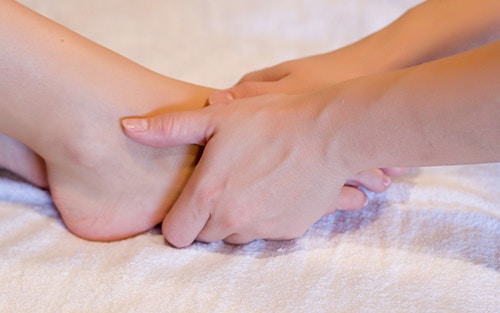Prevent stress and anxiety from robbing you of your peace and tranquility. Knowing how to center yourself and relax benefits your health and wellness in immeasurable ways.

yourfootpalace.com gathered information on 9 ways you can quickly relax and regain your peaceful state of being.
1. Deep Breathing
By adjusting your breathing rate and pattern, you can stimulate the body’s parasympathetic nervous system, triggering a calming response, which decreases your heart rate, blood pressure, and muscle tension. Here’s how:
- Sit comfortably or lie down
- Inhale slowly through your nose until your stomach rises
- Hold your breath and count to three
- Exhale slowly, allowing your stomach to fall
Tip: There are many versions to this exercise. Experiment until you find one that works for you.
2. Practice Yoga
Regular yoga practice can foster mental clarity and calmness, increase body awareness, relieve chronic stress, center one’s attention, and sharpen concentration.
3. Spend Time Outdoors
You can find relaxing places all around. Just head to the beach, a park, the woods, a trail, or a quiet spot beside a stream. Most know how relaxing it is to be outside, but not everyone knows or recognizes nature’s healing effects.
4. Get a Massage

A massage therapist’s touch can elevate the body’s dopamine level, significantly affecting one’s inspiration, joy, and enthusiasm. Ultimately, the gentle pressure applied through massage stimulates the body’s circulation, helping you relax and rest.
Tip: Couple’s massages can help lessen mutual stressors and tension.
5. Spend Your Time Off – Off
Occupy your downtime from work with a movie, gardening activities, board games, weight lifting, sightseeing, or visiting a museum. By making time to pursue activities you enjoy, you give your mind a chance to deflect whatever makes you anxious.
6. Declutter
When you can’t find a place to store things, chances are you’ll leave them lying around so you can deal with them later. The more “stuff” you have, the more surfaces you have that collect dust and allergens. This alone can decrease the air quality in your home and creates a stressful situation when specific items or papers must be quickly located.
7. Eat Healthier

Consuming a healthier diet can lead to significant health and wellness improvements. Among the benefits of a more nutritious diet is an increased ability to resolve issues and avoid undue stress. Consider the following benefits of eating healthier:
- Lowers risk of heart disease, type 2 diabetes, obesity, and some cancers
- Helps the digestive system maintain proper function
- Helps achieve and maintain a healthy weight
- Increases skin, teeth, and eye health
- Supports muscle growth, strengthening, and repair
- Boosts immunity
- Strengthens bones
- May help you live longer
Tip: Consult your primary care physician and a nutritionist before attempting any radical or fad diets. Weight loss or weight gain should be closely monitored to prevent severe health problems.
8. Reduce Alcohol Consumption
Low and moderate doses of alcohol can increase one’s expression, happiness, and euphoria. However, over time, excessive alcohol consumption can result in the development of chronic diseases and other issues, including:
- Digestive problems
- Liver Disease
- Stroke
- Heart Disease
- Hypertension
- Stress
- Anxiety
Note: Elevated alcohol consumption can also significantly contribute to the development of breast, mouth, throat, esophagus, colon, and rectum cancers.
9. Stop Smoking
While smoking may seem to temporarily relax or de-stress one’s state of being, the reality and long-term effects of tobacco consumption are substantially different. According to the Centers for Disease Control and Prevention, smoking causes or significantly contributes to:
- Hypertension
- Cancer
- Heart Disease
- Heart Failure
- Stroke
- Lung Diseases
- Kidney Failure
- Diabetes
- Chronic Obstructive Pulmonary Disease (COPD)
Tip: Your body will begin to heal shortly after you quit smoking, and the sooner you give up the habit, the greater the benefit will be to your health and wellness.
Stress-Related Conditions

Allowing the stress of daily pressures or traumatic events to infiltrate your decisions and personal interactions can significantly contribute to the following conditions:
- Hypertension
- Heart Disease
- Obesity
- Depression
- Anxiety
- Gastrointestinal Disorders
- Diabetes
Note: When you perceive danger or feel threatened, your body releases stress hormones, including adrenaline and cortisol, which prepare the body for emergency action. Subsequently, your heart rate increases, muscles tighten, blood pressure rises, breath quickens, and your senses sharpen.
How To Relax
In this article, you discovered nine easy ways to quickly get rid of stress and anxiety, leaving you on a path to better health and increased wellness.
Living a less stressful life can significantly improve your overall state of being while drastically reducing some of the contributing factors to severe health and emotional conditions.
Allowing stress to dominate your life and choices can lead to poor lifestlye decisions and debilitating conditions over time.
Sources:
hopkinsmedicine.org/health/wellness-and-prevention/9-benefits-of-yoga
cdc.gov/nutrition/resources-publications/benefits-of-healthy-eating.html
mayoclinic.org/healthy-lifestyle/nutrition-and-healthy-eating/in-depth/alcohol/art-20044551
cancer.org/healthy/stay-away-from-tobacco/health-risks-of-tobacco/health-risks-of-smoking-tobacco.html
(706) 521-5290
(678) 963-5958